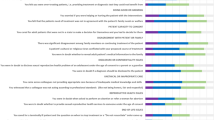Abstract
OBJECTIVE: To identify the ethical dilemmas that internists encounter, the strategies they use to address them, and the usefulness of ethics consultation.
DESIGN: National telephone survey.
SETTING: Doctors’ offices.
PARTICIPANTS: General internists, oncologists, and critical care/pulmonologists (N=344, 64% response rate).
MEASUREMENTS: Types of ethical dilemmas recently encountered and likelihood of requesting ethics consultation: satisfaction with resolution of ethical dilemmas with and without ethics consultation.
RESULTS: Internists most commonly reported dilemmas regarding end-of-life decision making, patient autonomy, justice, and conflict resolution. General internists, oncologists, and critical care specialists reported participating in an average of 1.4, 1.3, and 4.1 consultations in the preceding 2 years, respectively (P<.0001). Physicians with the least ethics training had the least access to and participated in the fewest ethics consultations; 19% reported consultation was unavailable at their predominant practice site. Dilemmas about end-of-life decisions and patient autonomy were often referred for consultation, while dilemmas about justice, such as lack of insurance or limited resources, were rarely referred. While most physicians thought consultations yielded information that would be useful in dealing with future ethical dilemmas (72%), some hesitated to seek ethics consultation because they believed it was too time consuming (29%), might make the situation worse (15%), or that consultants were unqualified (11%).
CONCLUSIONS: While most internists recall recent ethical dilemmas in their practices, those with the least preparation and experience have the least access to ethics consultation. Health care organizations should emphasize ethics educational activities to prepare physicians for handling ethical dilemmas on their own and should improve the accessibility and responsiveness of ethics consultation when needed.
Similar content being viewed by others
References
Lo B, Schroeder S. Frequency of ethical dilemmas in a medical inpatient service. Arch Intern Med. 1981;141:1062–4.
Connelly J, DalleMura S. Ethical problems in the medical office. J Am Med Assoc. 1988;260:812–5.
Purtilo R. Ethics consultation in the hospital. N Engl J Med. 1984;311:983–6.
La Puma J. The clinical ethicist at the bedside. Theor Med. 1991;12:141–9.
Singer P, Pelegrino E, Siegler M. Ethics committees and consultants. J Clin Ethics. 1990;1:263–7.
Organizations JCfAoH. 2000 Hospital Accreditation Standards. Oakbrook Terrace, Ill: Joint Commission; 1999.
Ausilio M, Arnold R, Youngner S. Health care ethics consultation: nature, goals, and competencies. A position paper from the Society for Health and Human Values-Society for Bioethics Consultation Task Force on Standards for Bioethics Consultation. Ann Intern Med. 2000;133:59–69.
Day J. An assessment of a formal ethics committee consultation process. HEC Forum. 1994;6:18–30.
La Puma J. Community hospital ethics consultation: evaluation and comparison with a university hospital service. Am J Med. 1992;92:346–51.
La Puma J. An ethics consultation service in a teaching hospital. Utilization and evaluation. J Am Med Assoc. 1988;260:808–11.
Orr R, Moon E. Effectiveness of an ethics consultation service. J Fam Pract. 1993;36:49–53.
Orr R. Evaluation of an ethics consultation service: patient and family perspective. Am J Med. 1996;101:135–41.
McClung J. Evaluation of a medical ethics consultation service: opinions of patients and health care providers. Am J Med. 1996;100:456–60.
Schneiderman L, Gilmer T, Teetzel H. Impact of ethics consultation in the intensive care setting: randomized, controlled trial. Crit Care Med. 2000;28:3920–4.
Dowdy M, Robertson C, Bander J. A study of proactive ethics consultation for critically and terminally ill patients with extended lengths of stay. Crit Care Med. 1998;26:252–9.
Schneiderman LJ, Gilmer T, Teetzel HD, et al. Effect of ethics consultations on nonbeneficial life-sustaining treatments in the intensive care setting: a randomized controlled trial. JAMA. 2003;290:1166–72.
Sinnott-Armstrong W. Moral Dilemmas. New York, NY: Basil Blackwell, INC; 1988.
Fowler FJ. Improving Survey Questions: Design and Evaluation. Thousand Oaks, Calif: Sage Publications; 1995.
Sirken M, Hermann D, Schechter S, Schwarz N, Tanur J, Tourangeau R, eds. Cognition and Survey Research. New York, NY: Wiley Publishers; 1999.
Arnold R. Teaching clinical medical ethics: a model programme for primary care residency. J Med Ethics. 1988;14:91–6.
Loewy E. Teaching medical ethics during residency. J Med Educ. 1986;61:661–5.
Perkins H. Teaching medical ethics during residency. Acad Med. 1989;64:262–6.
Perkins H, Geppert C, Hazuda H. Challenges in teaching medical ethics in medical schools. Am J Med Sci. 2000;319:273–8.
Howe K. Medical students’ evaluations of different levels of medical ethics teaching: implications for curricula. Med Educ. 1987;21:340–9.
Jacobson J. Internal medicine residents’ preferences regarding medical ethics education. Acad Med. 1989;64:760–4.
Jennett P, Crelinsten G, Kinsella T. Advanced training in biomedical ethics: a curriculum in clinical specialty programmes. Med Educ. 1993;27:484–8.
Fletcher J, Siegler M. What are the goals of ethics consultation? A consensus statement. J Clin Ethics. 1996;7:122–6.
Casserett D, Daskel F, Lantos J. The authority of the clinical ethicist. Hastings Cent Rep. 1988;28:6–11.
Walker M. Keeping moral open space: New images of ethics consulting. Hastings Cent Rep. 1993;23:33–40.
Spike J, Greenlaw J. Ethics consultation: high ideals or unrealistic expectations. Ann Intern Med. 2000;133:55–7.
Association AM. Physician Characteristics and Distribution in the U.S. 2000/2001. Chicago, Ill: AMA; 2001.
Asch D, Jedrziewski M, Christakis N. Response rates to mail surveys published in medical journals. J Clin Epidemiol. 1997;50:1129–36.
Field T, Cadoret C, Brown M, et al. Surveying physicians: do components of the ‘Total Design Approach’ to optimizing survey response rates apply to physicians? Med Care. 2002;40:596–605.
Author information
Authors and Affiliations
Corresponding author
Additional information
This study was conducted while Dr. DuVal was a fellow in the Department of Clinical Bioethics at the Clinical Center of the National Institutes of Health. Funding was provided by the Clinical Center of the National Institutes of Health.
The opinions expressed here are solely those of the authors and do not reflect the views or policies of the Department of Health and Human Services or the National Institutes of Health.
Rights and permissions
About this article
Cite this article
DuVal, G., Clarridge, B., Gensler, G. et al. A national survey of U.S. internists’ experiences with ethical dilemmas and ethics consultation. J GEN INTERN MED 19, 251–258 (2004). https://doi.org/10.1111/j.1525-1497.2004.21238.x
Issue Date:
DOI: https://doi.org/10.1111/j.1525-1497.2004.21238.x



